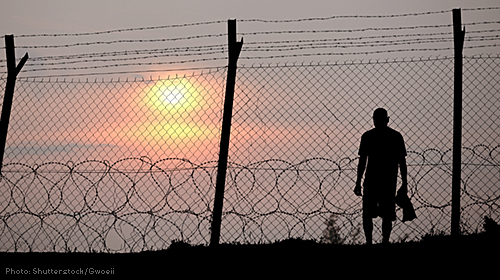Investigating Detention Conditions in Texas: Spreading Know Your Rights Information in the Lower Rio Grande Valley


A diverse coalition of immigrant rights and civil liberties groups met with officials of the Inter-American Commission on Human Rights (IACHR) earlier this week as the human rights investigators began their fact-finding visits to immigration detention centers in Texas. The IACHR is a regional human rights body, and part of the Organization of American States, of which the United States is a member.
As the IACHR began their visits, members of the staffs of the ACLU of Texas and the ACLU of New Mexico’s Regional Center for Border Rights spent two days in the Lower Rio Grande Valley presenting Know Your Rights meetings for community organizations and facilitated the distribution of more than 3,000 Know Your Rights door hangers and palm cards.
Representatives of 10 organizations gathered at the Austin offices of the ACLU of Texas calling for a full investigation of conditions at Texas detention facilities as part of the IACHR’s investigation of the treatment of migrants held in detention in the United States. A press conference called by the ACLU of Texas, Grassroots Leadership, and Austin Immigrants’ Rights Coalition, generated statewide coverage of the IACHR visits with particular interest in the T. Don Hutto family detention center (PDF). Bob Libal, Texas Campaign Coordinator at Grassroots Leadership noted:
The explosive increase in detention through government programs … has created a huge boon for the private prison industry…These facilities are built and operated with minimal oversight, so international human rights bodies like the IACHR can play a crucial role in monitoring the use and conditions within these private prisons.
Jason Cato from the Austin Immigrants’ Right Coalition, a group of immigrants, students, labor, faith, and community groups added:
The increase in federal funding and pressure for local law enforcement to engage in immigration regulation … has compounded the potential for human rights violations like racial profiling and dangerous, inappropriate police tactics. Local police shouldn’t be enforcing the civil provisions of federal immigration law, and the results, in terms of decreased public safety and increased detention, come at great cost to U.S. taxpayers and democratic ideals.
Also among the groups meeting with the IACHR delegation: American Gateways, Catholic Charities, Familias Unidas por la Esperanza, Migrant and Child Welfare National Network, Texas Appleseed, and Texans United for Families.
The community group representatives also expressed the following concerns:
- Hutto remains an unlicensed facility and there will be no external monitoring when the settlement expires.
- Continued expansion of detention facilities, especially by private companies. The question remains as to whether the new administration will proceed with this expansion.
- The present “color code” system for detainees means that when “reds,” with the worst criminal histories, have to be moved within the facility, all other detainees (“oranges” and “blues”) must be in their cells, i.e. rooms, which means that the entire facility is essentially on lockdown.
- Many of the facilities do not have full-time doctors, nurses or psychiatrists on staff raising concerns about the quality and availability of medical care.
In addition to meeting with advocates, the IACHR officials toured several detention facilities in Texas, including the Willacy Detention Center, known as “tent city” due to its construction of windowless Kevlar tents, in Raymondville; the T. Don Hutto family detention center in Taylor where immigrant families are held; and the International Emergency Shelter Unaccompanied Minor Shelter in Los Fresnos. The IACHR will issue a report by the end of 2009 on its findings.
The ACLU of Texas is hopeful that the IACHR’s investigation will shed further light on ways the U.S. government can and should do better in the way it treats immigrants. Lisa Graybill, Legal Director for the ACLU of Texas, and one of the attorneys who litigated against the T. Don Hutto facility to improve conditions for families detained there, noted:
Texas is ground zero for U.S. immigration policies which violate human rights….Given that Hutto is still not licensed by the state, when the court’s oversight of the Hutto settlement expires on August 29, 2009, the need for scrutiny by outside bodies like the IACHR will be even more acute.
Learn more about the ACLU of Texas: www.aclutx.org, and the ACLU of New Mexico and Regional Center for Border Rights: www.aclu-nm.org.

